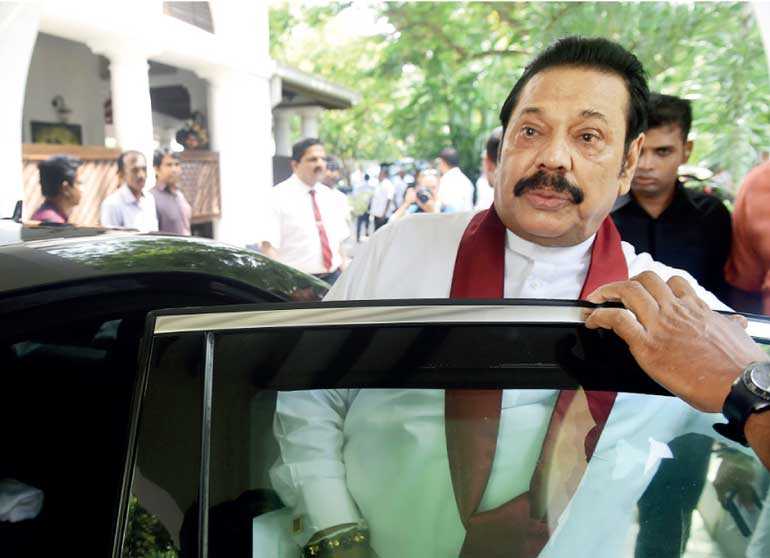Saturday Feb 21, 2026
Saturday Feb 21, 2026
Thursday, 15 November 2018 00:46 - - {{hitsCtrl.values.hits}}

Former President Mahinda Rajapakse (C) leaves the official residence in Colombo on 11 November. - Sri Lanka’s former strongman leader Mahinda Rajapaksa on 11 November vowed snap elections would go ahead to “seek a mandate from the people” after the President’s sacking of Parliament plunged the country deeper into political turmoil – AFP
AFP: Among Sri Lankans, political veteran Mahinda Rajapaksa earned the nickname “Lord of the Rings” thanks to his taste for gem-laden rings and an epic battle. But the former strongman president lost his magic in his latest comeback bid.
Renowned and feared for his brutal ending of the country’s prolonged Tamil separatist war in 2009, Rajapaksa is a big believer in fate.
With nearly every finger bearing a lucky gem, the 72-year-old consults astrologers even for political decisions. But something went wrong when he agreed to become prime minister on 26 October after President Maithripala Sirisena sacked Ranil Wickremesinghe.
The strategy failed and the numbers in Parliament did not add up. Wickremesinghe refused to leave the official residence, and the assembly voted Rajapaksa’s rival government down on Wednesday.
It was the latest blow for the politician who ruled Sri Lanka for a decade up to a surprise defeat in a 2015 presidential election.
Since then, Rajapaksa and his family and allies have faced increasing legal and political pressure over fallout from the years in power. Several face legal action for corruption.
Political pedigree
Rajapaksa comes from a well-connected political family in the southern district of Hambantota. His father, D.A. Rajapaksa, was a prominent independence activist and cabinet minister.
The younger Rajapaksa studied law but at 24 – before he had even qualified as an attorney – he became an MP.
Using his expert espousal of conservative Buddhist values, Rajapaksa became prime minister in 2004 and narrowly beat Wickremesinghe to the presidency a year later in their first showdown.
His two terms made him one of Asia’s most controversial leaders. His name is feared by Tamils and his battles with the United Nations have become legendary.
Rajapaksa ordered the military campaign to end the 37-year-old Tamil conflict in May 2009, although he has rejected allegations that at least 40,000 Tamil civilians were killed by Government forces in the closing weeks of the civil war.
More than 100,000 people died during the whole conflict.
He fought off UN demands for an investigation and some international leaders boycotted a Commonwealth summit that he hosted in November 2013.
But his action to end the threat from Tamil Tiger suicide bombers made him a hero among the majority Sinhalese community. He won a huge majority for his second term and blamed the Tamils for voting against him when he was beaten in 2015 by Maithripala Sirisena.
Highlighting the tumultuous state of Sri Lankan politics, Sirisena was an ally who turned against him for the 2015 race – before changing allegiance again to make Rajapaksa his prime minister last month.
‘Charismatic leader’
The Sri Lankan strongman is still beloved by many of the country’s Sinhalese population. Political commentator Kusal Perera called him “the most charismatic Sinhala Buddhist leader”.
“You are the father of our nation,” wrote Shehan Udayanga, one of 1.3 million followers of Rajapaksa on Facebook.
As president he oversaw rapid economic growth, built Sri Lanka’s first expressway and rolled out new highways and railroads.
But critics say Rajapaksa lost the 2015 elections in a pushback against nepotism and massive corruption.
His ambitious infrastructure projects ended up as white elephants and left the country facing a mountain of debt – mainly to China. Unable to service the loans, the Wickremesinghe Government last year leased a Chinese-built port at Hambantota to a Beijing company for $1.12 billion.
Sirisena’s Government launched several investigations into charges Rajapaksa and his family siphoned off billions of dollars, but prosecutions were extremely slow. Rajapaksa says his family is the target of a political vendetta.
His potential return had worried Tamils in Sri Lanka as well as foreign governments.
The International Crisis Group had warned Tamil activists and journalists “will be at risk of increased harassment or worse” and “so too will critics of the Rajapaksa family and dissenters throughout the country.”
But while he might have been voted down in the most recent Parliamentary poll, few doubt that Rajapaksa is consulting his astrologers about his next move.